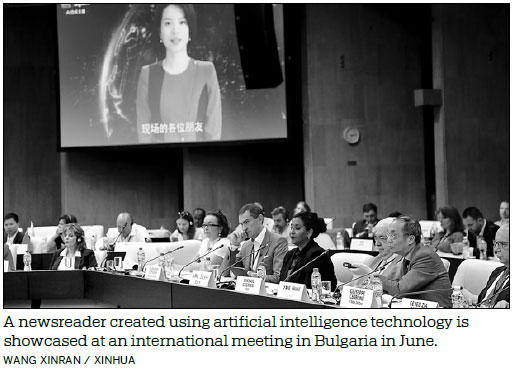Sogou expands to online literature with new avatar readers
Chinese search engine company Sogou recently announced its intent to apply its artificial intelligence technology to online literature, creating unique experiences for online readers.
The technology enables readers to become closer in proximity with authors, with author-inspired lifelike avatars reading novels in the latter's voices.
The move came after an agreement signed by Sogou and online reading platform iReader earlier this month, part of Sogou's efforts to expand its AI services.

Sogou has launched several AI-enabled products, including judge assistants and newsreaders in recent years.
"Invention patents have accounted for 99.5 percent of the world's total patents concerning core AI technologies used in such sectors as voice and vision processing," said Zang Lei, Sogou's legal director.
"Intellectual property is a shield for products and plays a role in helping companies maintain competitiveness in the information technology industry," Zang said.
The tech company has established a complete IP protection system for its AI development incorporating basic information, frontier technologies and technology adoption, he added.
"With the burgeoning AI industry, IP is very important for a high-tech company," Zang said, adding that the improved IP environment in China has also provided better judicial protection for high-tech companies and gives them confidence in the AI technological research.
According to a report on the AI race among China, the European Union and the United States, which was released by the Center for Data Innovation, China leads in two of six categories of metrics the report examines - adoption and data.
The US has an edge in the AI competition in the rest four categories - talent, research, enterprise development and hardware.
Of 100 total available points in the report's scoring methodology, the US leads with 44.2 points, followed by China with 32.3 points and the EU with 23.5 points.
China has made clear progress relative to the US in most metrics, and significantly outpaces the EU in AI funding and adoption, the report said.
Zhang Xiaofei, deputy head of the Machine Translation Institute on Scientific Literature affiliated to Intellectual Property Publishing House, said that with the rapid development of AI, the applications of related patents are on the rise all over the world.
IP plays an active role in helping companies expand markets and increase their capabilities of self-innovation and risk control, Zhang said.
"The essence of the competition in the high-tech sector is IP instead of technologies," he said.
The institute has developed an AI translation system for patent documents, claiming more than 90 percent accuracy.
"AI technologies have advantages in data collection and analysis, which is conducive to increasing efficiency in work on patents' search and review as well as analysis of infringements," Zhang said.
In 2017, the State Council released a guideline on developing new-generation AI, aiming to increase the annual industrial output value of the country's core AI industry to more than 150 billion yuan ($20.94 billion) by 2020.
Fast-growing AI technology will bring challenges to the IP system, he said, adding that there will be more patent disputes when AI is increasingly developing into an industry.
Zhang said he hoped that decision-makers will not only value the technological advancement in the AI field, but also promote research into related legislation.
liangkaiyan@chinadaily.com.cn
(China Daily 08/29/2019 page17)














